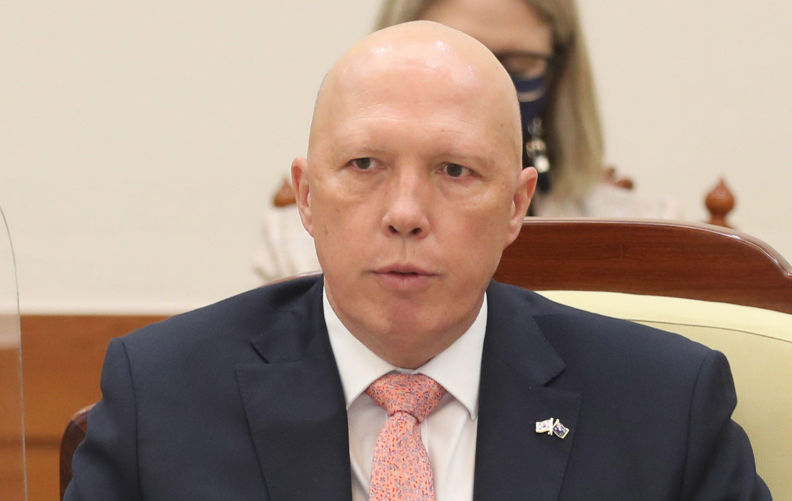It’s only the first week – and if you thought Peter Dutton’s election campaign looks chaotic, dishevelled, and thin on policy substance, you’re right.
There’s a long way to go in this five-week campaign and there’s no doubt Anthony Albanese has a fight on his hands as polls have consistently shown. However, this has not been a good start for Dutton.
It began with Treasurer Jim Chalmers’ budget speech, replete with the largely anticipated cost of living measures on which the Albanese Government is making its strongest re-election pitch: expanded Medicare bulk-billing, three-day childcare guarantee, urgent care clinics, transition to renewables, fee-free TAFE, energy relief and, the surprise package – a two-stage tax cut for all taxpayers to “top up” the revamped stage 3 tax cuts announced last year.
Chalmers’ tax cut comes from lowering the tax rate for the lowest paid workers from 16% to 15% in mid-2026, and to 14% the following year. There is a tax equity dimension at play here as well as the obvious tax cut. Cutting the lowest tax rate is an important, albeit small, recalibration of the income tax structure, reducing the share of tax paid by the lowest paid in the total income tax take, as it should be.
Surprisingly, shadow treasurer Angus Taylor immediately announced his party would not support the tax cuts and the Coalition duly voted against it. Even more remarkable was that Dutton then promised that, if elected, a Coalition Government would legislate to increase income tax and reverse Chalmers’ tax cuts. The Opposition’s controversial election commitment to increasing income tax was the highly charged backdrop to one of the most important speeches in Dutton’s three years as leader of the Liberal Party, his budget reply speech.
It’s strange electoral territory to begin an election campaign, promising to increase income tax, particularly when added to Dutton’s unpopular promises to sack 41,000 public servants, to deny people the right to work from home and the right to disconnect, and to wind back the Albanese Government’s advances in renewable energy in preference to the mirage of nuclear power in 30 years’ time – perhaps.
All of which added to the significance of Dutton’s budget reply speech. Media drops hyping a “big announcement” fuelled expectations that the Opposition Leader would present a revised suite of Coalition policies on critical contemporary issues — housing, climate change, cost of living, an energy plan for the future, perhaps even some detail of the now forgotten nuclear energy policy — and a pathway for the Coalition into government.
We were promised a big announcement for the future, but what we got was a recycled version of the past. Dutton’s “big announcement” of a gas-reservation policy to retain a proportion of gas for domestic use was a cynical, and fossil fuel-focused, reworking of Scott Morrison’s “gas led recovery” – which failed to deliver either more gas or lower prices. Although Dutton called his gas reserve announcement “one of the most visionary policies put forward in our country’s history”, like a true conservative, he was looking in the rear-view mirror. There were no costings, no detail, and no indication of how it would work, how it would bring down prices, when or by how much. This was a paragraph, not a policy.
The recycled gas policy was mirrored by another “big announcement”, a promise to halve the fuel excise tax for 12 months, an effective tax cut for fossil fuel suppliers and not, as much of the media incorrectly described it, a cut in petrol price or a “petrol discount“. And this too was a lazy return to the policy past, the revival of another Morrison energy policy. We’ve heard this story before and we know how it ends – a brief trickle-down reduction in petrol prices and a rapid return to higher prices once the excise tax cut ends.
The exemplar of Dutton’s “speak first, think later” policy on the run was his eagerness to jump, too early and too hard, on the Donald Trump support wagon. Is it really only two months since Dutton praised the “shrewd” and “reasonable” Trump as a “big thinker” bringing “gravitas” to the Middle East, just as the US president was proposing that war-ravaged Gaza be “levelled” to the ground and used as a real estate opportunity? As the rest of the world looked on in horror as the unpredictable Trump’s discordant policy jumble unfolded – from tariffs to mass deportations, diminishing healthcare, thousands thrown out of work, and educational and cultural institutions purged of “DEI hires” and “false history”, Dutton was already on board and, despite his protestations, it was too late to jump off.
Without even waiting for the orange-tinged dust to settle on Trump’s peculiar brand of chaotic autocracy, Dutton appointed his very own DOGE leader in Senator Jacinta Nampijinpa Price to head a new efficiency program “which echoed the new US Department of Government Efficiency (DOGE), led by Elon Musk”, announced the slashing of 41,000 public servants’ jobs with all the shredding of government services from Medicare to veterans’ affairs, climate action and Centrelink that implies, and promised to undo the Albanese Government’s developments in renewables – also very like Trump. Two weeks ago, Dutton told the Lowy Institute that there was “common ground” with Trump; “There is much we have in common to take forward”; and just this week he has promised to slash education funding citing a “woke agenda” and “indoctrination” in schools in a more direct grab from Trump’s ruinous policy playbook. Despite the clearly well-deserved moniker of “Temu Trump”, Dutton now complains that reminding voters of his political proximity to Trump is “desperate sledging”.
Finally, in a moment of undiluted political hubris, Dutton told radio hosts Kyle and Jackie O that, if elected, he would not live in The Lodge, the official prime minister’s residence in Canberra, where Albanese lives, preferring the harbour-side views of Kirribilli House. “I’ll take Sydney any day over living in Canberra,” he said, dissing the nation’s capital and seat of government just as he hopes to be elected to lead it. It’s an astonishing political misjudgment that Dutton would refuse to live in the prime minister’s official workplace, Canberra, while at the same telling Australian workers they cannot work from home.
It’s too early to say the wheels are falling off Dutton’s campaign; however, it’s only week one and they’re looking decidedly shaky.
An earlier version of this article was first published in the Byron Bay local paper, The Echo
Jenny Hocking is emeritus professor at Monash University, Distinguished Whitlam Fellow at the Whitlam Institute at Western Sydney University and award-winning biographer of Gough Whitlam. Her latest book is The Palace Letters: The Queen, the governor-general, and the plot to dismiss Gough Whitlam. You can follow Jenny on Twitter @palaceletters.

